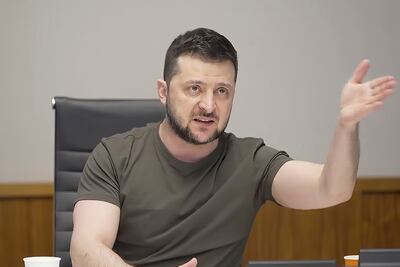Live updates: follow the latest news on Russia-Ukraine
Ukrainian troops defending the besieged city of Mariupol are free to leave and save themselves but insist on staying with their wounded brothers-in-arms, President Volodymyr Zelenskyy has said.
Mariupol has become synonymous with the humanitarian crisis unfolding during the war, with Ukraine accusing Russia of shelling aid convoys, cutting off supplies of food and medicine and laying waste to the strategic port city.
Bodies of soldiers and civilians are lying in the open air and efforts to remove them have largely failed, Mr Zelenskyy said in an interview with Russian media outlets in which he said he spoke regularly to troops defending Mariupol.
He said he had told them that “if you feel that you need to leave and you feel that it is right and that you can survive, do it”.
“I gave them that choice,” he said. “And they said: 'we can't, the wounded are here, we will not leave the wounded'. Moreover, they said they would not leave the dead.”
The interview angered Russia's media regulator Roskomnadzor, which told the domestic press not to publish Mr Zelenskyy's remarks and described the interviewers as foreign agents.
The Ukrainian president blames Russia for what he called a "humanitarian catastrophe" in Mariupol and said 2,000 children had been relocated by Russian forces to an uncertain fate via what Moscow says are evacuation corridors.
The city's mayor, Vadym Boychenko, told local media on Monday that about 160,000 people remained in the city out of a pre-war population of more than 400,000.

Peace talks
Speaking to the Russian journalists and separately to The Economist, Mr Zelenskyy said he was willing to broker peace directly with Russian President Vladimir Putin, including by negotiating a form of neutrality for Ukraine.
Any such agreement would be put to a referendum in Ukraine but could only take place if Russia withdrew all its troops from the country, said Mr Zelenskyy, who has in recent weeks played down the prospect of joining Nato and demanded what he calls security guarantees from the West.
He described the status of the Russian language in Ukraine as another area where progress could be made in negotiations but said the Kremlin's demands for demilitarisation and what it calls "denazification" were off the table.
In addition, Ukraine will reject any "compromises that may risk the disintegration of the country, the ones which Putin proposes, or rather demands in the form of an ultimatum", he said, amid contested claims to Crimea and the eastern Donbas region.
The two sides were expected to resume peace talks in Istanbul this week after three weeks without an in-person meeting, during which Russia's invasion has appeared to stall.
Mr Zelenskyy said Russian forces had been going around in circles and in some cases abandoning their tanks but renewed his appeal for more weapons from the West to fend off the invasion.
In the latest of his frank assessments of the performance of foreign leaders, which have stirred something of a bidding war for a coveted thumbs-up from Kyiv, Mr Zelenskyy offered guarded praise to UK Prime Minister Boris Johnson while giving a more critical verdict on the French and German leadership.
Mr Johnson "is a leader who is helping more" and Britain is "definitely on our side", said Mr Zelenskyy, although he could not say whether Britain wanted a swift Ukrainian victory or would accept a long war to weaken Russia.
By contrast, he said Germany was "making a mistake" with what he described as a more cautious policy and said remarks by French President Emmanuel Macron that leaders could not send tanks to Ukraine suggested they were "afraid of Russia".
The president said a Ukrainian victory in the war would mean saving as many lives as possible because its claims to land are important but "ultimately, it's just territory".
"We believe in victory. It’s impossible to believe in anything else," he said. "We will definitely win because this is our home, our land, our independence. It’s just a question of time."



































